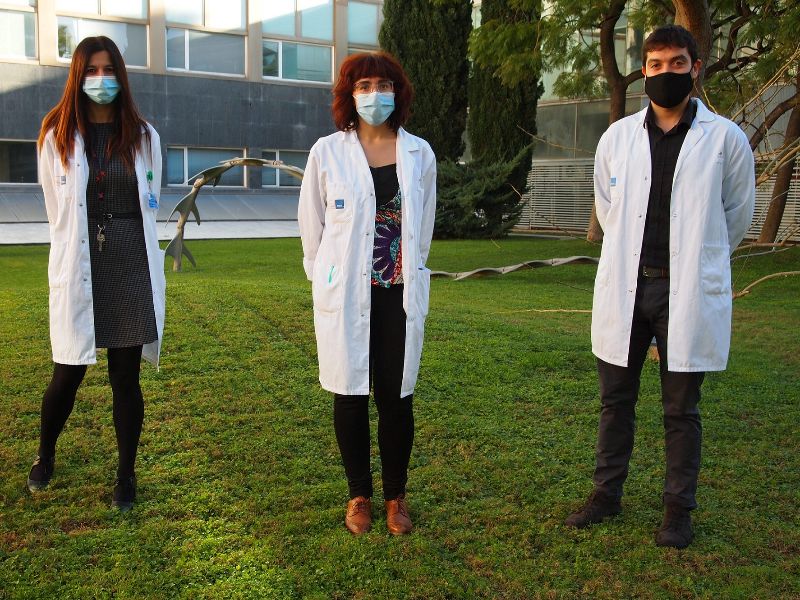
17/12/2020 - Covid-19
The condition of 60% of patients with cognitive impairment worsened as a result of the lockdown declared in response to the COVID-19 pandemic, according to their caregivers.
The lockdown declared on 13th March to halt the spread of COVID-19 had a particular impact on people with cognitive impairment, as revealed by a study published in the journal Frontiers in Neurology, carried out by doctors from the Neurology Service at Hospital del Mar and researchers from the Neurofunctionality and Language Research Group in the Hospital del Mar Medical Research Institute (IMIM-Hospital del Mar). Six out of every ten patients analysed suffered a worsening of their pre-pandemic condition, according to their caregivers.
The study followed 60 patients from the Neurology Service, with an average age of 75, together with their caregivers. A telephone survey was used to assess the functional and neuropsychiatric changes suffered by the patients, in addition to the extra workload put on the caregivers due to the restrictions caused by the pandemic. Their adaptation to lockdown and the safety measures implemented, possible changes in their place of residence, the medical support they received, falls, interruption of cognitive stimulation programmes, and the loss of daily routines were analysed.

From left to right: Dr. Aida Fernández, Dr.Ainara Barguilla and Dr. Albert Puig-Pijoan. Source: Hospital del Mar
25 patients (42%) had been diagnosed with Alzheimer's disease in the dementia phase and 15 (25%) with slight cognitive deterioration. The remainder were suffering various other types of dementia. Only six were infected with the SARS-CoV-2 coronavirus. The results, according to Dr. Aida Fernández-Lebrero, a consultant in the Neurology Service, an IMIM researcher, and second author of the work, indicate that "although there may also be cognitive deterioration, the neuropsychiatric symptoms have clearly been aggravated. Our study has given us reason to believe that lockdown has caused significant worsening in this area overall, but particularly with regard to depression, anxiety, agitation and loss of appetite."
Caregivers are also affected
According to the perception of the caregivers, in 60% of cases the patients themselves recognised they were suffering cognitive decline. Seven out of ten patients abandoned their daily activities. 43% stopped attending social gatherings, at day-care centres, for example, and 28% no longer received cognitive stimulation at specialist centres, as these closed. In addition, 42% stopped doing physical activity, even though before lockdown they used to go to the gym or out for a walk. Two out of every ten people stopped going shopping and 31% no longer visited relatives as they had done prior to the restrictions.
During lockdown, 15% of patients suffered episodes of delirium and 13% experienced an increase in the number of falls (62% of cases were in people with moderate dementia, probably due to closer monitoring by carers in cases of more advanced dementia or because of poor mobility). "The fact that our patients developed more affective rather than psychotic symptoms during confinement reflects the loneliness they were facing. The loss of resources, social gatherings and the lack of institutional support must have left them feeling abandoned", explains Dr. Ainara Barguilla, a Neurology Service resident at Hospital del Mar and the main co-author of the study. The caregivers perceived an increase in workload and stress in 41% of the cases, regardless of the patient's level of dementia. Seven (11% of the total) indicated that they were exhausted, particularly carers who look after patients with advanced levels of dementia. 16% of families reported problems accessing medical care. Two out of three received telephone support and in 21% of cases there were changes in psychopharmacological treatment during lockdown.
"Patients suffering neurodegenerative diseases are especially vulnerable to infections and changes in their routines. In fact, social isolation is linked to a worse prognosis", highlights Dr. Albert Puig-Pijoan, a consultant in the Neurology Service, an IMIM researcher, and one of the main co-authors of the work. The results of the study indicate that "We need to reach out to both patients and their carers and develop appropriate strategies for strengthening and adapting the health care and social support they receive", stresses Dr. Puig-Pijoan.
Reference article
Barguilla A, Fernández-Lebrero A, Estragués-Gázquez I, García-Escobar G, Navalpotro-Gómez I, Manero RM, Puente-Periz V, Roquer J and Puig-Pijoan A (2020) Effects of COVID-19 Pandemic Confinement in Patients With Cognitive Impairment. Frontiers in Neurology. 11:589901. doi=10.3389/fneur.2020.
© Institut Hospital del Mar
d'Investigacions MèdiquesLegal Notice and Privacy Policy | Cookie Policy | Site Index | Accessibility | Find Us | Contact